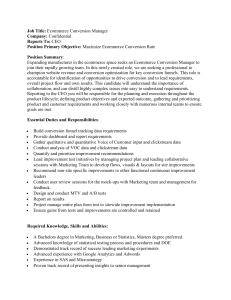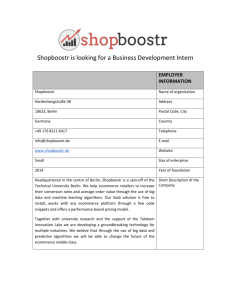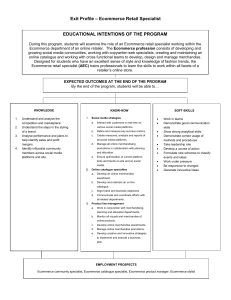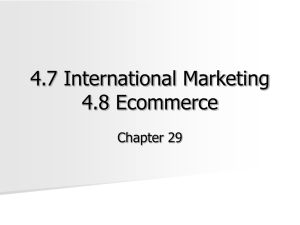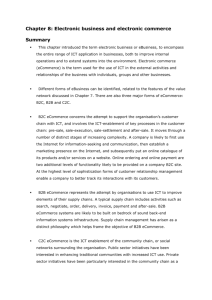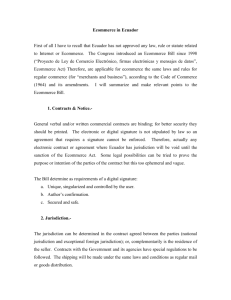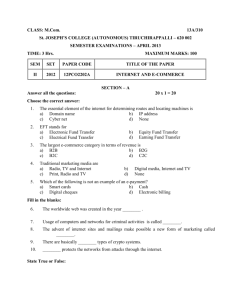Tele-Trade: Stepping-Stone or Stumbling
advertisement
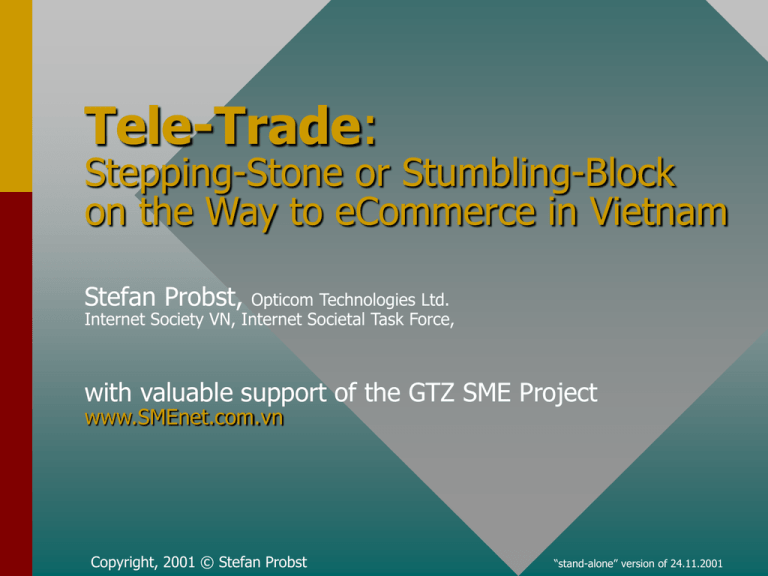
Tele-Trade: Stepping-Stone or Stumbling-Block on the Way to eCommerce in Vietnam Stefan Probst, Opticom Technologies Ltd. Internet Society VN, Internet Societal Task Force, with valuable support of the GTZ SME Project www.SMEnet.com.vn Copyright, 2001 © Stefan Probst “stand-alone” version of 24.11.2001 eCommerce, a double-sided sword: if late and/or insufficient: Digital Divide if early and sufficiently broad: Digital Opportunity “eCommerce” in Vietnam - Legislation - • “By end of 2005 a majority of Vietnamese businesses and all Government offices will be involved in eCommerce” • “… the legal environment is the primary factor for developing eCommerce… Relevant eCommerce laws have yet to be issued ...” • eCommerce Project under Ministry of Trade, 14 sub projects, 24 State bodies involved “eCommerce” in Vietnam - Business - • Much hype, little real action: until today (Nov. 2001), not a single Vietnamese site accepts firm orders or on-line payments. • VERY few companies have a detailed on-line catalogue, i.e. the first step to eCommerce. • Until recently (before “Decree #55”), Internet presence was difficult and/or expensive. e.g.: eCommerce in the US • B2B Totals in 98: 50 bln, in 99: 180 bln, in 00: 400 bln US$ • Digital Signature Law in June 2000 only • eCommerce started in the US - and many other parts of the world before specific legislation was enacted! • How was this possible? Before there was eCommerce ... • Because in many countries in the West, there was long time already “Tele-Trade”: – buyers and sellers never meet in person; an “unpersonal” business relation – offering, ordering, payment, delivery is done over a distance – post, telecom, and bank services made this possible; laws and regulations didn’t obstruct. e.g.: Tele-Trade in Germany (data taken from two biggest German mail-order companies) • 1878: Cash on Delivery Service by Post Office (seller sends good via post office, buyer pays on receiving to the post man post office transfers the money to the seller) (safe for the seller: looses max. the post/mailing fee, safe for the buyer: no need for advance payment) – VN: not yet! Tele-Trade in Germany • 1878: Cash on Delivery Service by Post Office • 1927: Mail-Order Company founded – not yet in VN (quite impossible without COD) Tele-Trade in Germany • 1878: Cash on Delivery Service by Post Office • 1927: Mail-Order Company founded • 1928: First printed catalogue – in VN since about mid ‘90s – still very rare and unusual – often very incomplete Tele-Trade in Germany • 1878: Cash on Delivery Service by Post Office • 1927: Mail-Order Company founded • 1928: First printed catalogue • mid 60s: Telephone orders – VN, since mid 90s: only for direct deliveries (e.g. gas bottles, fast food, medical services) or to known customers Tele-Trade in Germany • 1878: Cash on Delivery Service by Post Office • 1927: Mail-Order Company founded • 1928: First printed catalogue • mid 60s: Telephone orders • 1989: 24h-Delivery Service • 1990: Telephone orders 24h/7d (COD or CC) • 02.95: Catalogue on CD-ROM eCommerce in Germany • 08.95: from Tele-Trade to eCommerce: – eOffer: Catalogue in the Internet – eOrder: eMail or “shopping cart” on Website – eInvoice: eMail or print-out of Website, if at all – ePayment: with Credit Card on Website or via eBanking – eDelivery: (n/a in this case; only digital goods) alternative payments: * COD (cash on delivery) * “open invoice” (for known customers, state offices, etc.) From Tele-Trade to eCommerce • A comparable small step - for buyers and sellers from Tele-Trade to eCommerce! • If Tele-Trade is possible, then only very few additional legislation is needed, but some more is helpful: e.g. USA: * Digital Signature Law in June 2000 only Official Awareness in Vietnam • The Party and the Government consider eCommerce as important (but tend to underestimate the urgency). • International Donors are willing to assist (but think actually only about the small step from Tele-Trade to eCommerce and tend to forget the pre-conditions). Official’s and Media Awareness • Confusion about Segments, Importance, Implementation Differences: – B2C vs. B2B cited problems: “few credit cards, few bank accounts” “high connection cost” BUT B2B is world-wide larger than B2C, Businesses can easily obtain a credit card, they have bank accounts, and commercial benefits outweigh high connection cost Official’s and Media Awareness • Confusion about Segments, Importance, Implementation Differences: – B2C vs. B2B – domestic vs. international Differences: not always need for credit cards for domestic eCommerce, excessive import/export procedures, strict “financial Invoices” unknown abroad, foreign bank accounts are strictly regulated/not allowed, use of foreign currencies is regulated International segment is more important and more urgent Official’s and Media Awareness • Confusion about Segments, Importance, Implementation Differences: – B2C vs. B2B – domestic vs. international – import vs. export Differences: export is encouraged, therefore easier import is restricted, more difficult procedures Export more important than Import Official’s and Media Awareness • Confusion about Segments, Importance, Implementation Differences: – – – – B2C vs. B2B domestic vs. international import vs. export tangible products vs. digital goods vs. services Differences: import and export of digital goods and services is difficult to prove, which is important for taxation, much easier to deliver digital goods, than tangible ones, Official’s and Media Awareness • Confusion about Segments, Importance, Implementation Differences: – – – – – B2C vs. B2B domestic vs. international import vs. export tangible products vs. digital goods vs. services short vs. medium vs. long term connection cost could drop quite quickly BUT language barriers are high and will stay for much longer Official’s and Media Expectations • Try to Cover Every Eventuality, i.e. Over-Regulation of Business Risk, but: – eTransactions are limited in value Multi-Million Dollar Deals with unknown partners are not done via eCommerce – Risk is normal part of business Private entrepreneurs should be allowed to decide themselves what to do with their capital, even if this includes some risk for them. – Absence of Tele-Trade means lack of experience Businesses’ Awareness • Don’t recognize important changes during the last years (e.g. Commercial Law). • Believe too much the poor information in the media (e.g. “Cannot start until more Laws are issued”). • Wait sometimes too much for the State. • Often prefer to pay “tea money” instead of insisting on their rights (e.g. when new regulations). The Situation in Vietnam • The most important eCommerce enabling laws are already in place! – the Civil Code allows verbal contracts and contracts by specific action – the Commercial Law gives agreements by eMail and other electronic communication the status of written contracts – a new official letter allows export contracts by eMail etc., according to Commercial Law The Situation in Vietnam • The most important eCommerce enabling laws are already in place! • Tele-Trade is next to impossible: – no COD service by Post Office – sellers not used to comprehensive catalogues – details of taxation, customs, other regulations make Tele-Trade very difficult or impossible To Do - Short Term: The Government, Ministries, etc. • Introduce COD Service (DGPT) • Allow Basic Forms of Encryption for eCommerce (Gov. Committee on Encryption) • Allow Companies to open Bank Accounts Abroad to receive eCommerce payments. • Allow Verbal and Electronic Form for “Economic Contracts” (Government) To Do - Short Term: The Government, Ministries, etc. • Speed-up the Implementation of Payment Gateway (Banks, Finance Ministry) • Allow Foreign Currencies for Domestic eCommerce (as long as VND is not yet possible). • Set-up a “Red Tape eTask Force” where businesses can report problems with existing regulations - and maybe get solutions To Do - Medium Term: The Government, Ministries, etc. • Overhaul - or abolish - the Ordinance on Economic Contracts • Overhaul the Financial Invoice Regime • Focus on “Localization” of the Internet: * Tools (Hardware and Software) * Standards * Content (other problems will disappear over time, or solved elsewhere, but this very big one will have to be solved by Vietnam itself) Difficult, but Possible Now • Domestic B2B Trade (very difficult to receive credit card payments) • Domestic B2C Trade (but no “trial sales”) (very difficult to receive credit card payments and no COD, therefore only advance payment or open invoice) • Note: paying on-line with a credit card is usually done via an encrypted Internet transmission protocol (https). Encryption is at present not allowed in VN. Possible Now Already • Export of Tangible Goods (via foreign payment clearing house, or conventional payment) • Import of Tangible Goods (using a credit card or conventional payment) (but needs a “contract” by eMail or webpage) • Import of Digital Goods for Re-sale (actually grey-area: goods would be de-facto smuggled into VN, but since all taxes (VAT) would be paid on re-sale, the state would loose no taxes) Benefits • SMEs can get additional foreign customers - no need to visit expensive fairs abroad - no middle man, therefore make full use of low labour cost • Easy International Procurement - wide range of available products - search for lowest prices Benefits • Study Competition (as part of marketing) - adapt products (to the customer’s taste) - adapt prices (stay competitive) • Bridge Domestic Urban-Rural Gap: - buy from everywhere - sell to everywhere Conclusions • NO new laws are needed to START • Some changes are needed to make it easier • Most of the changes could be done quickly • Allow business risks - at least for private sector • Foreign Markets don’t wait - Act now! • Domestic Sellers: Prepare and Start NOW! Conclusions From US Government “A Framework for Global Electronic Commerce”: “There is a great opportunity for commercial activity on the Internet. If the private sector and governments act appropriately, this opportunity can be realised for the benefit of all people.” eCommerce Consultancy: eCommerce@opticom-vn.com eCommerce Workgroup: eCommerce@ISOC-VN.org Full presentation, with translation, will be on-line at www.ISOC-VN.org
